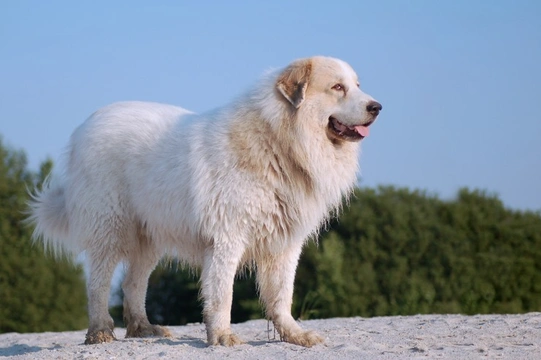
Pyrenean mountain dog hereditary health and health testing
The Pyrenean mountain dog is a large breed of dog that was originally used as a livestock guardian by shepherds in the Pyrenees Mountains between France and Spain. Males of the breed can stand up to 32” tall at the withers and weigh up to 54kg, with females being slightly smaller.
The breed has a very long, thick coat with two layers, with the outer hair being coarse and the undercoat being dense and woolly but very fine. The tail hair is plumed, and the legs are feathered, with the hair on the head and face being slightly shorter and finer. The breed is also distinctive due to having not just one but two sets of dewclaws on the hind legs, a trait that very few other breeds possess. The hair of the Pyrenean mountain dog is mainly white, and may have markings in grey, tan, or rust around the face and head.
If you love large breeds of dogs and the furry, white Pyrenean mountain dog appeals to you, you might be considering looking into ownership of the breed in the future. As part of this, it is important to find out as much as possible about the general health, any hereditary health issues and average longevity of the breed as a whole, before committing to a purchase. We will look into these factors in more detail within this article.
Pyrenean mountain dog longevity
The average lifespan of the Pyrenean mountain dog is 10-11 years, which is slightly lower than the average across the board for breeds of all types, but near to the lower range of the average for all breeds of a similar size and build.
Genetic diversity
The coefficient of inbreeding statistic across the breed as a whole is 3.7%, which indicates that the Pyrenean mountain dog is overall a genetically diverse breed, which is not subjected to a high amount of inbreeding and selective breeding in order to keep the breed lines viable. The accepted average figure across the board for pedigree dog breeds is 6.25% or lower.
Conformation
The shape and build of the Pyrenean mountain dog as a whole is considered to be proportionate and in balance, and not particularly likely to predispose dogs of the breed to any health or welfare concerns due to their conformation. However, there are a couple of potential problems within the breed that potential owners should be aware of:
- The white coat of the breed provides an elevated chance of deafness within the breed.
- The size and weight of the dog can cause skeletal problems, and young dogs in particular should be carefully managed to discourage overexertion that can place added pressure on the growing joints and bones.
- The shape of the breed’s eyes can lead to medical canthal pocket syndrome, in which the corners of the eyes collect dust and dirt, which can cause irritations and eye damage.
Health testing
The Kennel Club and the British Veterinary Association advise pre-breeding health testing for the Pyrenean mountain dog, in order to identify a predisposition to certain hereditary health conditions. Participation in these testing programmes can help to provide a full picture of breed health, and permit breeders to make an informed decision on the viability of their parent dogs.
Current testing schemes in place for the breed are:
- Hip score testing, with the breed’s mean hip score being 10.4. Potential parent dogs should attain a hip score below this number in order to be considered viable.
- DNA testing for multifocal retinopathy, which leads to lesions of the eye and retinal detachment.
- DNA testing for degenerative myelopathy, a condition of the spinal cord that leads to weakness and paralysis.
- DNA testing for Glanzmann’s thrombasthenia type one, a condition that can lead to serious mucosal bleeding.
Other health issues
As well as the conditions outlined above, the breed is also known to have a propensity to certain other health conditions, but for which no screening programmes or pre-breeding testing schemes are currently available. Such conditions include:
- Epilepsy, which can often be managed with medication. However, epileptic dogs should not be used for breeding.
- Hereditary deafness, which is sometimes present in dogs with a white or mainly white coat.
- Factor one deficiency, a blood deficiency that leads to a clotting disorder.
- Tricuspid dysplasia of the tricuspid valve of the heart, which can ultimately lead to heart failure.
- Patellar luxation, a condition that causes the kneecaps to slip and dislocate.
- Panosteitis, an inflammatory condition of the bones.
- Various forms of cancers, including sweat gland tumours and osteosarcoma.
- Osteochondrosis, a condition of the shoulder than leads to pain and lameness.
- Entropion of the eyelids, a condition in which the lower lids of the eyes tilt inwards, causing them to rub on the cornea and cause sores and pain.



